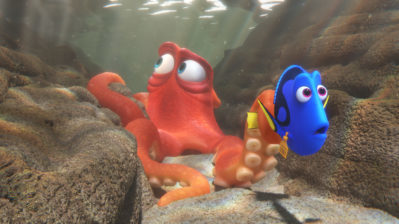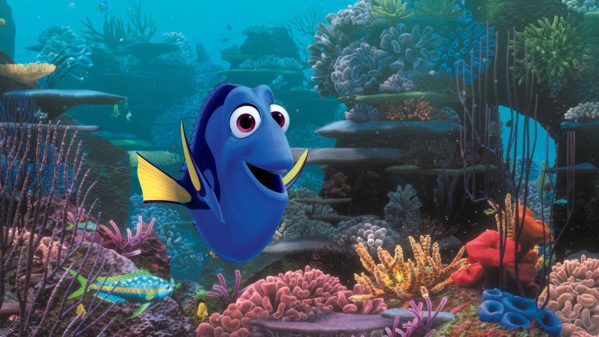REVIEW: ‘Finding Dory’ follows beloved fish on journey to find her parents

Finding Nemo still stands as one of the strongest entries in the storied history of Pixar. That animated classic follows Marlin (Albert Brooks), a frantic father, as he searches for his lost son. Along for that journey is Dory (Ellen DeGeneres), who steals the show in the original movie and now is the subject of her very own animated feature.
Finding Dory follows the lovable blue-colored fish as she searches for her own parents. She has few memories of herself as a child in the loving care of her mother and father because of her short-term memory loss. Even though the images of her parents are intermittent and unreliable, that doesn’t stop the intrepid fish from heading out into the open ocean and eventually a marine institution to find the place where she comes from. At its heart, the film is about discovering one’s roots and the reliance on friends in a world fraught with danger.
DeGeneres is a skilled voice actor, someone who earned Oscar buzz for her work on Finding Nemo. In this sequel, Dory receives the spotlight and, as a character, is definitely up to the challenge. She’s as kind and funny as ever, believing in the goodness of strangers and willing to talk to anyone. DeGeneres’ empathetic voice is perfectly matched with the fish’s personality.
The cast of supporting characters that help Dory along the way include Hank the octopus (Ed O’Neill), Destiny the whale shark (Kaitlin Olson) and Bailey the beluga whale (Ty Burrell). These three new friends are occupants in a marine institution that should seem vaguely familiar to audience members (to be honest, I didn’t see an orca anywhere, but I could picture one somewhere nearby). The marine facility is a center to rescue, rehabilitate and release marine animals that have become sick in the wild; however, they live unnatural lives in tanks that seem better suited for the hordes of visiting tourists. The facility’s dreaded touch tank comes off like a monster movie for the unfortunate fish at the mercy of grabbing hands.
Dory knows that her parents were occupants at the marine institution, so she sets out to find them by using the convoluted set of pipes in the facility. She always stays two steps ahead of complete catastrophe and has a knack to find a nearby water supply.

The adventure and comedy are off the charts in the oceanic tale. Andrew Stanton and Angus MacLane have directed a funny and touching movie, based on a script by Stanton, Victoria Strouse and Bob Peterson.
Perhaps the best legacy of both Finding Nemo and Finding Dory are the lessons the two films teach both children and adults. There are no real villains in these films. Everyone is good but flawed, happy but prone to needing more in life. They find and rely on friendship to overcome obstacles, and family members go well beyond biological ties. There’s a camaraderie and good-naturedness that should be celebrated in these films, and that’s extremely rare in today’s cynical cinematic landscape.
Unlike Pixar’s Cars 2, which felt like a cha-ching sequel for the animation studio, Finding Dory can stand on its own as a engaging summer flick and appropriate sequel to its predecessor.
By John Soltes / Publisher / John@HollywoodSoapbox.com
- Finding Dory
- 2016
- Directed by Andrew Stanton and Angus MacLane
- Written by Stanton, Victoria Strouse and Bob Peterson; based on a story by Stanton
- Starring the voice talents of Ellen DeGeneres, Albert Brooks, Ed O’Neill, Ty Burrell and Kaitlin Olson
- Running time: 103 minutes
- Rated PG for mild thematic elements
- Rating:





